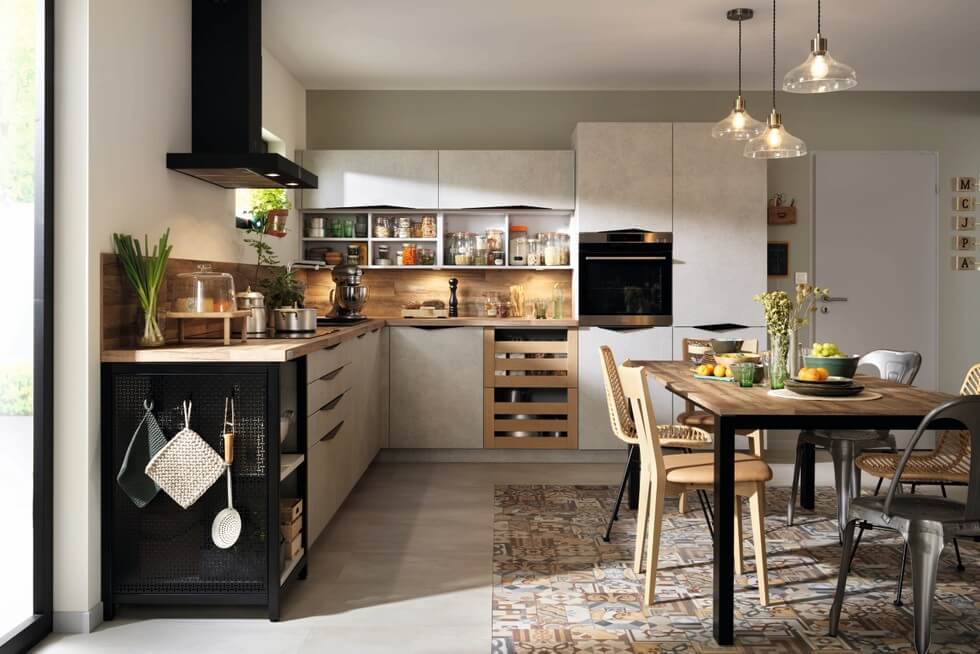Upgrading your kitchen to be more eco-friendly and sustainable is an excellent way to reduce your carbon footprint while also saving energy and money. Making these changes doesn’t have to be expensive.
From simple changes like investing in composting bins to switching out conventional light bulbs, there are lots of simple and affordable ways to reduce your environmental impact in the kitchen while helping to reduce food waste and carbon emissions. Read on to learn more about eco-friendly kitchen upgrades you can try today!
Start Composting
It’s time to add a compost bin. Composting helps reduce waste, lowers greenhouse gases, and enriches the soil. Place it on the countertop for easy access so you can add food scraps, eggshells, and biodegradable coffee filters.
Most food scraps can be added to a compost bin, so instead of throwing food scraps away, compost them and use the resulting rich soil to grow herbs, vegetables, and fruits in your garden–or even turn your kitchen into a culinary wonderland where you grow your own ingredients! Making this simple change will keep your kitchen waste from collecting in landfills and turn it into a nutrient-rich soil amendment!
Replace the Kitchen Faucet
Installing a new modern faucet in your kitchen is a great way to reduce water use. Reducing water use is an important factor in helping to conserve resources and save money on utilities. These fixtures are designed to deliver the same amount of water pressure as traditional models, but with significantly less water used at each turn. Newer modern kitchen faucets have a low-flow option that can save a considerable amount of water than what is normally consumed by older faucets.
Switch Out Your Lightbulbs
Start by swapping out all of your normal light bulbs for LED bulbs. LED bulbs use up less energy and last longer than traditional light bulbs allowing you to use less energy. This can result in lower electric bills. Just make sure you utilize natural light in the daytime by keeping kitchen lights off during the day whenever possible.
Invest in Energy-Efficient Appliances
Consider upgrading your kitchen appliances to be more energy efficient. From an induction cooktop to a convection oven and microwave oven, these types of appliances offer greater efficiency and control than gas-based models.
With an Induction Cooktop, direct heat transfers to the cooking vessel to reduce cooking time and energy usage, keeping your kitchen cooler by reducing the amount of unwarranted heat released! On the other hand, convection ovens operate with much less energy because of a fan that continuously circulates heated air. This moderating effect helps the oven attain temperatures more efficiently—so you can still get an optimal green kitchen without compromising cooking performance.
Switching to energy-efficient kitchen appliances will have a huge impact on your environmental footprint.
Opt for a Green Coffee Maker
Upgrading your coffee maker is a great way to be more sustainable. The best coffee machines will have a reusable filter and automatic shut-off. If you prefer single-serve machines like a Keurig vs a Coffee Pot, just make sure that the pods are recyclable.
Eco-Friendly Pots and Pans
One of the easiest ways to make your kitchen more eco-friendly is to upgrade your cookware and pots and pans. Pans, pots, and baking sheets should all be replaced with non-toxic, eco-friendly alternatives such as stainless steel, glass, and ceramic. These materials are easy to clean, help cook food quickly, and don’t contain any toxins.
Use Less Water with a Dishwasher
Upgrading to an energy-efficient dishwasher is the perfect way to make your kitchen more eco-friendly. Make sure the dishwasher has various cycle settings so you can choose the best one depending on how many dishes need to be washed, and remember to always use the air-dry option instead of heated dry.
A Recycling Bin is a Must
If you don’t already have one, try adding a recycling section to separate items that can be reused and recycled. You can also switch to biodegradable trash bags which are more sustainable than regular plastic ones. These small changes can go a long way in making your kitchen eco-friendly!
Get Thrifty and Buy Secondhand
Secondhand items that can be reused or repurposed save money and resources. Plus, they help keep waste out of landfills and give new life to older products. So, before spending money on brand-new items, consider a more sustainable option by shopping preowned, used, or second-hand. Hunt for items at the best places for used items, such as Facebook Marketplace, Offerup, or Goodwill, or simply ask a friend who might be looking to get rid of their items.
Use Natural Cleaning Products
Swap out harmful, harsh household cleaning products for more natural eco-friendly options. Natural ingredients, like baking soda and vinegar, are just as effective when it comes to removing dirt, germs, and other kitchen messes. Plus, they’re free from toxins that might harm your health and the environment.
Invest in Reusable Storage Containers
Investing in reusable storage containers can immediately reduce your kitchen’s amount of plastic waste. Whether it’s with glass, metal, or bamboo containers, any switch from one-time plastics to reusables can help the environment. Reusable containers are typically more durable and better at preserving your food’s freshness, meaning you won’t have to replace them as often.
Conclusion
Upgrading your kitchen to be more eco-friendly does not have to come with a high price tag. There are small measures you can make to ensure that your kitchen is sustainable. Simple things like replacing lightbulbs with energy-efficient LEDs, installing efficient appliances, and switching to sustainable raw materials can help reduce your kitchen’s environmental impact and energy consumption in your home

